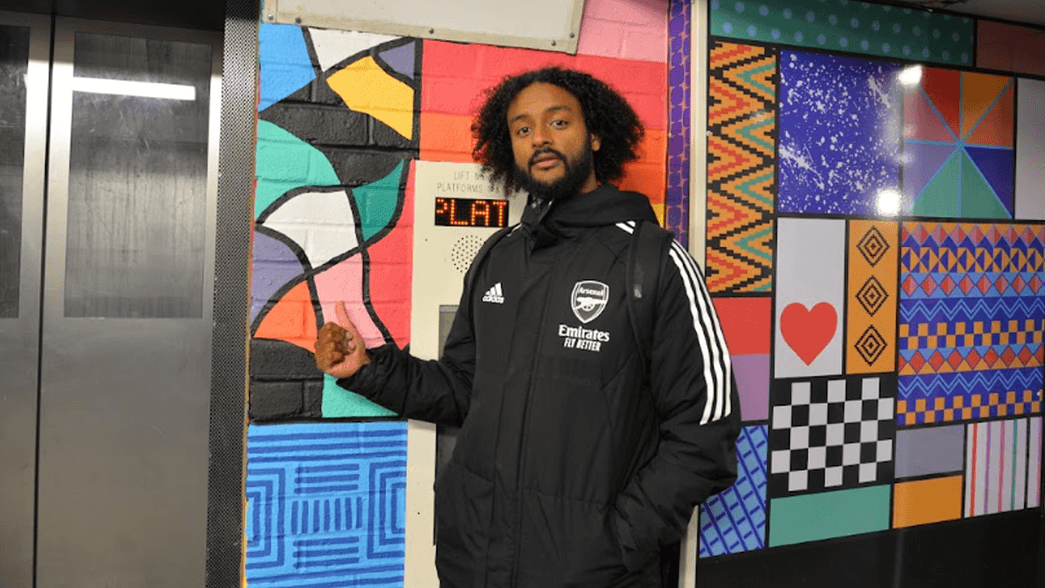As Eid al-Fitr, signifying the culmination of Ramadan, draws near, we hear from Arsenal in the Community’s Social Inclusion Manager Bruk Abdu about the significance of Ramadan and how he balances his spiritual practices with his professional responsibilities.
What’s your role at Arsenal?
As the Social Inclusion Manager of the Community Department, my primary responsibility is to oversee and ensure the successful operation of our free football access programmes in parks and estates across the three London boroughs of Camden, Islington and Hackney. This entails coordinating and supervising the implementation of these programmes to guarantee their effectiveness and impact within the local communities.
I also work to foster partnerships and collaborations with relevant stakeholders to support the sustainability and growth of these initiatives, ultimately striving to promote social inclusion and community engagement through the power of football.
What is Ramadan, for those who may not know about it?
Ramadan, the ninth month in the Islamic calendar, holds profound significance because it commemorates the period when the Quran was revealed to the final prophet and messenger, Muhammad. Throughout this sacred month Muslims observe a period of fasting, abstaining from food and drink from dawn until sunset for 30 days. The pre-dawn meal is known as suhur, while the meal to break the fast at sunset is called iftar. The essence of fasting during Ramadan is to nurture and strengthen one's connection with God, known as Allah in Islam.

How do you typically prepare for Ramadan?
Preparation for Ramadan is a deeply personal journey, and for me it typically involves a gradual build-up in the months leading up to the holy month. I often initiate this process by incorporating one or two days of fasting per week, gradually increasing the frequency as Ramadan approaches. If I'm feeling spiritually strong then I may start this as early as two months beforehand.
I also find it helps to maintain a Ramadan planner and journal. This involves introspection to identify any spiritual deficiencies in my life and setting specific goals for improvement. These objectives encompass various aspects including my character development, nurturing relationships and other areas of personal growth.
How do you manage your daily schedule during Ramadan where you work with fasting and prayers?
Navigating the dynamic nature of my role can indeed be challenging because each day presents different demands. To manage this effectively, I maintain a clear weekly schedule in my calendar, which includes designated prayer times, team meetings, and my fasting schedule. I also ensure open communication with my team regarding my fasting routine.
My line manager, Jack Ironside, has been incredibly supportive throughout this process. Together we've adjusted my working hours to accommodate my early mornings and the timing of my fast-breaking, allowing me to start and finish earlier when needed.
On top of that, Arsenal has provided two designated prayer areas within the spaces where I work, enabling me to fulfill my prayer obligations conveniently. Also, being in close proximity to the Holloway mosque, I make use of this facility whenever feasible to continue my spiritual practices throughout the day.
Have you faced challenges or difficulties, and how did you overcome them?
I attended the Arsenal vs Luton game along with a group of young people from our programmes as a reward for their hard work. One of the challenges we faced was that the game kicked off just ten minutes before we were due to break our fast. Despite this, with careful preparation and planning, we ensured that we had snacks available in our bags. When Luton player Issa Kabore broke his fast, we all broke our fast together. Then, ten minutes later, we were able to leave our seats and head to a designated prayer area within the stadium.

Managing this during a busy live football game while supervising young people was challenging, but everything went smoothly. I must commend the club for providing designated prayer areas within the stadium, which facilitated our religious obligations seamlessly. We took a total of 13 children to the game, with eight of them observing the fast.
Have you observed Ramadan in another country?
I've had the privilege of observing Ramadan back home in my motherland of Ethiopia, and it was truly an extraordinary experience. Being immersed in the warmth and rich cultural context of Ethiopia, a land with a profound Islamic history, added to the spiritual significance of the holy month. Ethiopia holds a special place in Islamic history because it was one of the earliest destinations where Muslims migrated to.
During my time in Ethiopia, particularly in the capital city of Addis Ababa, I felt spiritually invigorated. The vibrant atmosphere, coupled with the heritage and traditions embedded in the region, contributed to a profound sense of spiritual strength and connection. It was a deeply enriching experience that left a lasting impact on me.
How good is it to see that football is becoming culturally inclusive in allowing Muslim footballers to break their fast?
Granting Muslim Premier League players a window to break their fast during matches marks a significant step forward. In the past there may have been misconceptions or negative stereotypes surrounding this practice. But the fact that players, authorities and fans alike now show acceptance and understanding of different cultures is truly commendable. It demonstrates a collective embrace of diversity and inclusivity within football, fostering a sense of unity and togetherness among all involved.

Copyright 2025 The Arsenal Football Club Limited. Permission to use quotations from this article is granted subject to appropriate credit being given to www.arsenal.com as the source.




